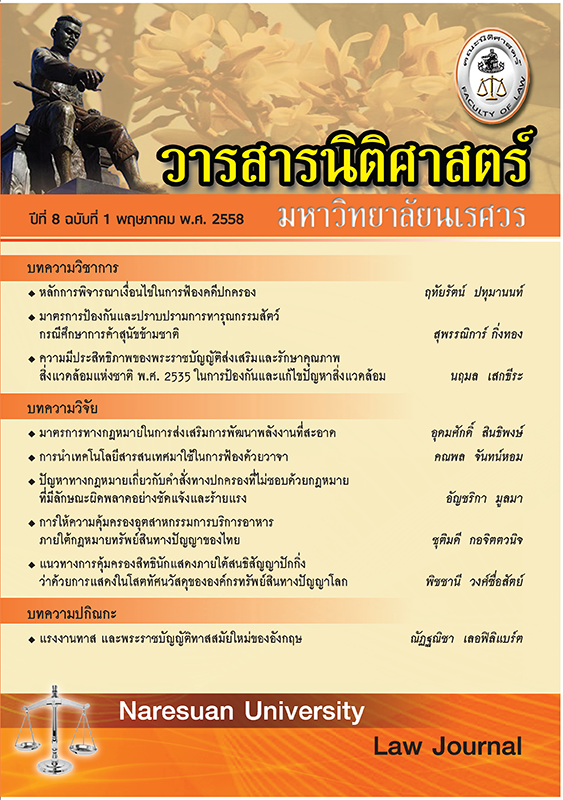Legal Measures for the Promotion of Clean Energy Development
Main Article Content
Abstract
This research aims to study the legal measures to promote the development of clean energy by comparing the measurement of the United States of America, the European Union and Thailand. The results showed that the policy of the US law supports the development of clean energy systematically. It promotes the use of sustainable energy by reducing energy consumption; supports research, technology development, and industrial energy efficiency; enacts the national energy security act which aims at increasing the production of clean renewable fuels, raising the efficiency of products, buildings and vehicles, and reducing greenhouse gas emissions; and improves the performance of the government. Energy policy of the EU based on marketing instruments such as tax measure, subsidies, trading, volume of carbon dioxide emissions, the development of energy efficiency technologies, renewable energy or low carbon dioxide energy, and financial instruments. The EU incorporates measures all together and has the strategic energy technology plan in order to search for link between clean energy and technologies to extract such clean energy from the natural resources. In relation to Thailand, the law is enacted the management measures systematically. It focuses on energy management in buildings and factories; notwithstanding, it does not cover the energy used in transport policy. However, the law has set plans and projects in the area of energy conservation and alternative energy range by performing through the National Energy Policy Council. In recommendations from the research, it should prepare a strategic energy technology plan to link between power and technology and an environmentally friendly cities plan. Moreover, it should define legal measures to motivate the production of renewable energy such as the production tax credit by allowing the tax credit for alternative energy production, the investment tax credit, and the tax credit for residential renewable energy. Also, it should give fund to the development of renewable energy projects. Furthermore, it should be an incentive measure for using energy efficiently such as reducing a tax to buildings that are able to reduce power consumption up to the standards set.
Article Details
References
ดาวัลย์ วิวรรธนะเดช. “พลังงานกับการพัฒนาที่ยั่งยืน.” วารสารพลังงานสถาบันวิจัยพลังงาน จุฬาลงกรณ์มหาวิทยาลัย. 4, (2546): 1-9.
นารายณ์ รัตนไพโรจน์ขจี. “การแก้ปัญหาภาวะโลกร้อนของประเทศไทยกับนโยบายพลังงานไทย.” วารสารพลังงานสถาบันวิจัยพลังงานจุฬาลงกรณ์มหาวิทยาลัย. 4, (2546): 20-33.
พระธรรมปิฎก. การพัฒนาที่ยั่งยืน. พิมพ์ครั้งที่ 12. กรุงเทพฯ: มูลนิธิโกมลคีมทอง, 2552.
สำนักงานที่ปรึกษาด้านวิทยาศาสตร์และเทคโนโลยี ประจำสถานเอกอัครราชทูต ณ กรุงวอชิงตัน ดีซีประเทศสหรัฐอเมริกา. "สถานภาพนโยบายด้านวิทยาศาสตร์ นวัตกรรม และพลังงาน ของประเทศสหรัฐอเมริกา."แก้ไขล่าสุดเมื่อ 2553. สืบค้นเมื่อ 3 เมษายน, 2558, จาก https://www.ostc.thaiembdc.org/document/Inno%20report.pdf.
สิรินทรเทพ เต้าประยูร. (April-June 2010). “Sufficiency Carbon Society มาสร้าง ‘สังคมคาร์บอนพอเพียง’ ด้วยกัน.” Horizon. 24, (2010): 36-41.
Anna Nagurney. Supply Chain Network Economics: Dynamics of Prices, Flows, and Profits. Cheltenham, U.K. : Edward Elgar, 2006.
Commission on the European Communities. Action Plan for Energy Efficiency: Realising the Potential, Brussels, 19.10.2006, COM (2006) 545 final., 8, 2006.
Commission on the European Communities. Investing in the Development of Low Carbon Technologies (SET-Plan). Brussels, 7.10.2009, COM(2009) 519 final., 2, 2009.
EU Focus. Commission proposes measures to establish new energy policy. N.p.: n.p., 2007.
EII. "Implementation Plans." Accessed April 3, 2015. https://setis.ec.europa.eu/activities/implementation-plans.
Energy Research and Development Institute, Chiang Mai University, under the Supervision of Thailand Greenhouse Gas Management Organization (TGO). Energy & Climate Change in Thailand Analysis of Policy Environment and Capability Gaps. N.p.: n.p., n.d.
Environmental and Energy Study Institute. "Industrial Energy Efficiency: Using New Technologies to Reduce Energy Use in Industry and Manufacturing. Eesi.org." Accessed April 3, 2015. https://archives.eesi.org/publications/Fact%20Sheets/EC_Fact_Sheets/EE_Industry.pdf.
European Commission. "Energy Efficiency in Buildings." Accessed April 3, 2015. https://ec.europa.eu/energy/efficiency/buildings/buildings_en.htm.
"Proposal for a CEPS Task Force on the EU Strategic Energy Technology (SET) Plan: From Concept to Practice." Accessed April 3, 2015. https://www.ceps.eu/files/20100928TFSET-Plan_Prosp.pdf.
Ruffing, K.. “Indicators to Measure Decoupling of the Environmental Pressure from Economic Growth.” In: Hak, T.; Moldan, B. Dahl, A.L.OLDAN, B.; (Orgs). Sustainability Indicators: a scientific assessment. Washington: Island Press, 2007.
"Strategic Energy Technologies Information System." Accessed April 3, 2015. https://setis.ec.europa.eu/activities/intiatives.
Thailand Greenhouse Gas Management Organization (Public Organization). CDM Implementation in Thailand. Bangkok: Thailand Greenhouse Gas Management Organization, 2008.
The European Wind Energy Association. "EU Energy Policy to 2050: Achieving 80-95% Emissions Reductions." Accessed April 3, 2015. https://www.ewea.org/fileadmin/ewea_documents/documents/publications/reports/EWEA_EU_Energy_Plicy_to_2050.
United Nation. Our Common Future. N.p.: WECD, 43, 1987.


